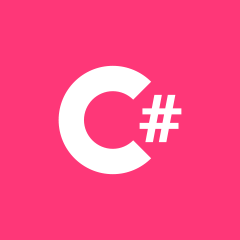数组作为字典键会产生很多冲突
我需要使用数字(长整型)列表作为字典键,以便对它们进行一些分组计算。
当直接使用长数组作为键时,我遇到了很多冲突。如果我使用 string.Join(",", myLongs) 作为键,它会按照我的预期工作,但速度要慢得多(我认为,因为哈希更复杂)。
这是一个演示我的问题的示例:
Console.WriteLine("Int32");
Console.WriteLine(new[] { 1, 2, 3, 0}.GetHashCode());
Console.WriteLine(new[] { 1, 2, 3, 0 }.GetHashCode());
Console.WriteLine("String");
Console.WriteLine(string.Join(",", new[] { 1, 2, 3, 0}).GetHashCode());
Console.WriteLine(string.Join(",", new[] { 1, 2, 3, 0 }).GetHashCode());
输出:
Int32
43124074
51601393
String
406954194
406954194
如您所见,数组返回不同的哈希值。
有没有办法既能获得长数组哈希的性能,又能获得字符串哈希的唯一性?
请参阅下面我自己的答案,了解所有建议的性能比较。
关于潜在的重复- 该问题有很多有用的信息,但由于这个问题主要是关于寻找高性能替代方案,我认为它仍然提供了一些此处未提及的有用解决方案。
 慕田峪7331174
慕田峪7331174浏览 329回答 5
5回答
-

一只甜甜圈
第一个不同实际上是件好事。数组是一种引用类型,幸运的是它们在哈希生成期间(以某种方式)使用引用。我猜想这类似于机器代码级别使用的指针,或者某些垃圾收集器级别的值。其中一件事您没有影响,但如果您将相同的实例分配给新的引用变量,则会被复制。","在第二种情况下,您将获得由和(new[] { 1, 2, 3, 0 }).ToString();应返回的内容组成的字符串的哈希值。默认值类似于类名,因此当然在两种情况下它们都是相同的。当然,字符串具有所有这些有趣的特殊规则,例如“像值类型一样比较”和“字符串驻留”,因此散列应该是相同的。 -

慕妹3242003
您的字符串正确地返回相同字符串的相同哈希码,因为string.GetHashCode()是以这种方式实现的。的实现int[].GetHashCode()对其内存地址进行一些处理以返回哈希码,因此具有相同内容的数组将返回不同的哈希码。这就是为什么具有相同内容的数组返回不同的哈希码。您应该考虑为数组编写一个包装类来提供正确的哈希码,而不是直接使用数组作为键。这样做的主要缺点是计算哈希码将是一个 O(N) 操作(它必须是 - 否则它不会代表数组中的所有数据)。幸运的是,您可以缓存哈希代码,因此它只计算一次。使用可变数组作为哈希码的另一个主要问题是,如果在将数组用作哈希容器(例如字典)的键后更改数组的内容,则会破坏该容器。理想情况下,您只会对从未更改的数组使用这种散列。考虑到所有这些,一个简单的包装器将如下所示:public sealed class IntArrayKey{ public IntArrayKey(int[] array) { Array = array; _hashCode = hashCode(); } public int[] Array { get; } public override int GetHashCode() { return _hashCode; } int hashCode() { int result = 17; unchecked { foreach (var i in Array) { result = result * 23 + i; } } return result; } readonly int _hashCode;}您可以使用它来代替实际的数组,以生成更合理的哈希代码。根据下面的评论,这是该类的一个版本:制作数组的防御性副本,使其无法被修改。实现相等运算符。将底层数组公开为只读列表,因此调用者可以访问其内容,但无法破坏其哈希码。代码:public sealed class IntArrayKey: IEquatable<IntArrayKey>{ public IntArrayKey(IEnumerable<int> sequence) { _array = sequence.ToArray(); _hashCode = hashCode(); Array = new ReadOnlyCollection<int>(_array); } public bool Equals(IntArrayKey other) { if (other is null) return false; if (ReferenceEquals(this, other)) return true; return _hashCode == other._hashCode && equals(other.Array); } public override bool Equals(object obj) { return ReferenceEquals(this, obj) || obj is IntArrayKey other && Equals(other); } public static bool operator == (IntArrayKey left, IntArrayKey right) { return Equals(left, right); } public static bool operator != (IntArrayKey left, IntArrayKey right) { return !Equals(left, right); } public IReadOnlyList<int> Array { get; } public override int GetHashCode() { return _hashCode; } bool equals(IReadOnlyList<int> other) // other cannot be null. { if (_array.Length != other.Count) return false; for (int i = 0; i < _array.Length; ++i) if (_array[i] != other[i]) return false; return true; } int hashCode() { int result = 17; unchecked { foreach (var i in _array) { result = result * 23 + i; } } return result; } readonly int _hashCode; readonly int[] _array;}如果您想使用上面的类而不需要创建数组的防御性副本,则可以将构造函数更改为:public IntArrayKey(int[] array){ _array = array; _hashCode = hashCode(); Array = new ReadOnlyCollection<int>(_array);} -

12345678_0001
另一种选择是利用鲜为人知的方法IEqualityComparer来实现您自己的哈希和相等比较。关于构建良好的哈希值,您需要注意一些注意事项,并且在密钥中包含可编辑数据通常不是一个好的做法,因为如果密钥发生变化,它会带来不稳定,但它肯定比使用字符串连接。public class ArrayKeyComparer : IEqualityComparer<int[]>{ public bool Equals(int[] x, int[] y) { return x == null || y == null ? x == null && y == null : x.SequenceEqual(y); } public int GetHashCode(int[] obj) { var seed = 0; if(obj != null) foreach (int i in obj) seed %= i.GetHashCode(); return seed; }}请注意,这仍然可能不如元组那么高效,因为它仍在迭代数组而不是能够采用更恒定的表达式。 -

慕村225694
如果您知道正在使用的数组的长度,则可以使用Tuple.Console.WriteLine("Tuple");Console.WriteLine(Tuple.Create(1, 2, 3, 0).GetHashCode());Console.WriteLine(Tuple.Create(1, 2, 3, 0).GetHashCode());输出Tuple12481248 -

慕码人2483693
建议如下:int[] 作为键(最初的尝试——根本不起作用,作为基准包含在内)字符串作为键(原始解决方案——有效,但速度慢)元组作为键(由David建议)ValueTuple 作为键(受 Tuple 启发)直接 int[] hash 作为 keyIntArrayKey(由Matthew Watson建议)int[] 作为Skeet 的 IEqualityComparer 的键int[] 作为David 的 IEqualityComparer 的键我生成了一个列表,其中包含一百万个长度为 7 的 int[] 数组,其中包含 100 000 到 999 999 之间的随机数(这是我当前用例的近似值)。然后我复制了这些数组的前 100 000 个,以便有 900 000 个唯一数组,以及 100 000 个列两次(以强制冲突)。对于每个解决方案,我枚举了列表,并将键添加到字典中,或者如果键已经存在则增加值。然后我打印了有多少个键的 Value 大于 1**,以及花费了多少时间。结果如下(从最好到最差排序):Algorithm Works? Time usageNonGenericSkeetEquality YES 392 msSkeetEquality YES 422 msValueTuple YES 521 msQuickIntArrayKey YES 747 msIntArrayKey YES 972 msTuple YES 1 609 msstring YES 2 291 msDavidEquality YES 1 139 200 ms ***int[] NO 336 msIntHash NO 386 msSkeet IEqualityComparer 仅比直接使用 int[] 作为键稍慢,其巨大优势在于它确实有效,所以我将使用它。** 我知道这不是一个完全万无一失的解决方案,因为理论上我可以得到预期的碰撞次数,而实际上并不是我预期的碰撞,但是经过多次运行测试,我相当确定我不。*** 没有完成,可能是由于糟糕的散列算法和大量的相等性检查。必须将数组数量减少到 10 000 个,然后将时间使用量乘以 100 来与其他数组进行比较。
 随时随地看视频慕课网APP
随时随地看视频慕课网APP
相关分类





 C#
C#